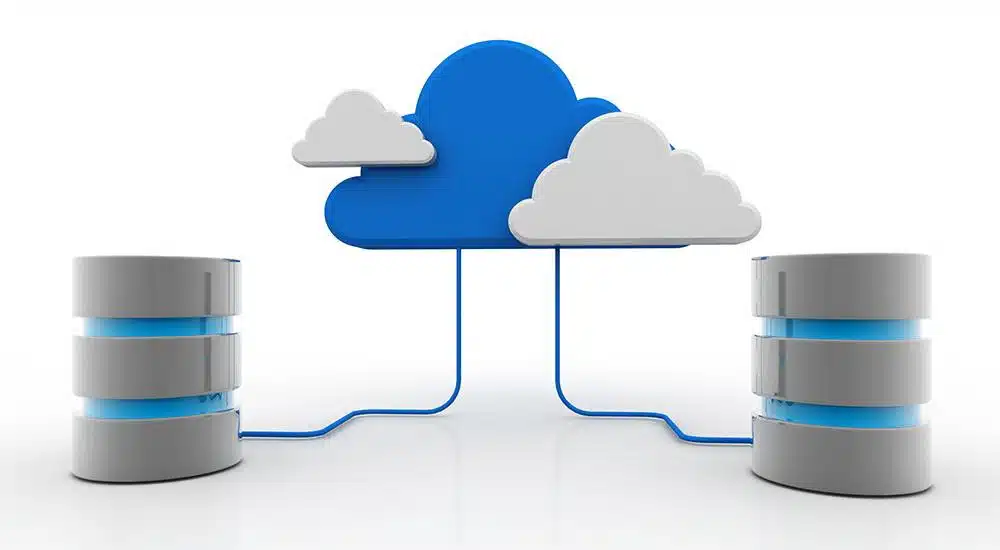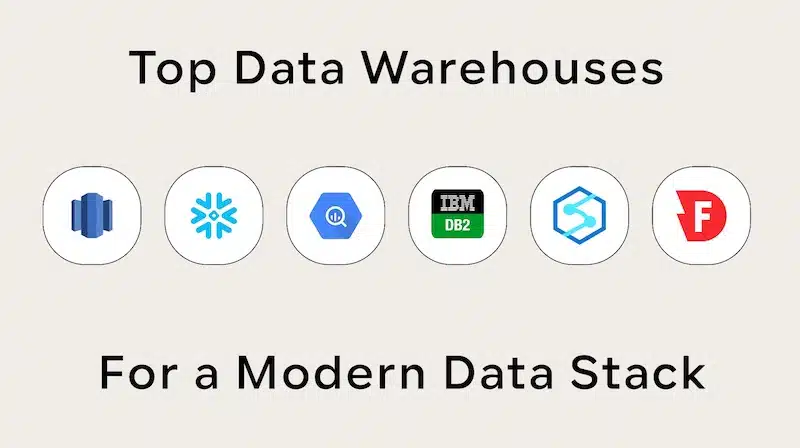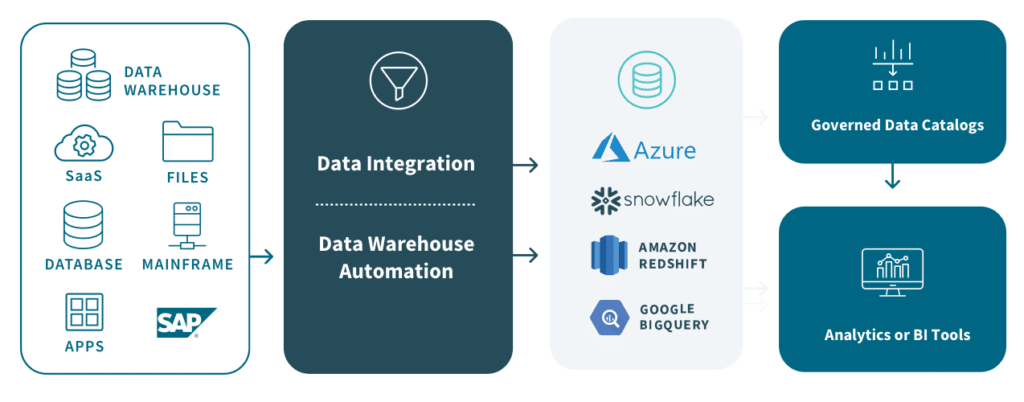Are you ready to reap the benefits of data warehouse automation? Many organizations are taking on the task of modernizing their data tech stack in terms of setting up systems to use data.
The technology landscape has evolved significantly over the past few years, with increasing businesses embracing cloud services to drive digital transformation. Cloud computing companies are becoming increasingly popular due to the numerous benefits they offer.
Advantages of a cloud based data warehouse
Scalability and Flexibility
One of the primary advantages of a cloud based data warehouse is its ability to scale resources on demand. With cloud data warehouse services from Snowflake Computing, you can quickly increase or decrease storage capacity and computing power as needed, ensuring optimal performance without investing in expensive hardware upgrades. This flexibility is vital for businesses that experience fluctuations in data volume, and it allows for seamless cloud data warehouse modernization as new technologies emerge.
Cost Efficiency
Cloud data warehouse implementation offers businesses a more cost-effective solution than traditional data warehouses. Cloud services eliminate the need for businesses to purchase, maintain, and upgrade expensive hardware infrastructure, which can lead to significant cost savings. Additionally, cloud computing companies typically offer pay-as-you-go pricing models, allowing you to only pay for the resources you use, further reducing costs.
Enhanced Security
Cloud data warehouse providers prioritize data security to protect your data from unauthorized access and breaches. Using advanced encryption, multi-factor authentication, and other security measures, cloud data warehouse consulting companies help safeguard your valuable information while maintaining compliance with industry regulations.
Improved Data Integration
Creating an efficient data integration architecture is essential for businesses to streamline operations and improve decision-making. A virtual data warehouse modernization effort allows for seamless integration across multiple sources, enabling businesses to access and analyze their data in real time. This increased visibility into your data helps drive better business insights and supports data-driven decision-making.
Support for Business Transformation
A cloud data warehouse consulting firm focused on how a cloud data warehouse implementation can help your organization adapt to the ever-changing business landscape. By leveraging the power of cloud services and modern data warehouse solutions, businesses can become more agile and better equipped to respond to market changes.
Expertise and Support
Working with cloud data warehouse experts ensures that your organization has access to knowledge and support throughout the implementation process. At Data-Sleek, we have a wealth of experience in data warehouse challenges. We can provide guidance on best practices for data integration, security, data governance, and management, ensuring a successful transition to the cloud.
What is a Cloud Based Data Warehouse?
A data warehouse, sometimes called a cloud data warehouse, is a repository that collects and stores data from disparate sources within an organization. Through orchestration, the process happens automatically; the data is cleansed, standardized, and integrated before it is made available to business users for data analysis. It’s helpful to look at other resources on data warehousing Geeks for Geeks, for example, highlights that A Data Warehouse is separate from DBMS and stores a vast amount of data.

This means that all operational tools can become sources of information to inform business decisions at a macro level. More complete data translates to better decision-making power.
Cloud Based Data Warehouse
This technology allows for data storage and querying from the cloud.
Cloud data warehousing software is a technology that allows you to store and query data in the cloud. This can be a great option if you’re looking to reduce your on-premises hardware requirements or take advantage of the cloud’s scalability and elasticity.
When evaluating a data warehouse in the cloud, you’ll want to consider the following aspects of your data:
Volume – How much data do you need to store?
Variety – How diverse is your data?
Location – Where is your data located?
Processing – How much data needs to be processed?
Querying – How often do you need to query your data?
Cost – What’s the cost of using a data warehouse in the cloud?
Why It Matters
The cloud warehouse is a new technology that is becoming more popular. It allows for cloud data storage, making it easier for companies to access and share data. This can be useful for companies that need to store a lot of data or be able to access it quickly.
Using parallel parallelism, vast quantities of data can be processed in minutes, not hours or days. This can be done using multiple processes to accomplish a single task, but not all data warehouses are set up to enable this kind of work. The data warehouse architecture often dictates what processes you can apply to the data.
Comparison Guide: Top Cloud Data Warehouses
When it comes to data warehouses, the cloud is the new frontier. Cloud data warehouses are growing in popularity for various reasons, including the ability to spin up new instances quickly, the scalability to handle large amounts of data, and the pay-as-you-go pricing model that eliminates the need for capital expenditure.
If you’re considering cloud data warehouses, it’s essential to understand the different options available. This guide compares to help you choose a cloud data warehouse provider today.

There are a few different cloud data warehouse (cloud dwh) providers on the market. They all offer different features, and cloud data warehouse architecture can vary widely, so deciding which is best for your needs can be challenging.
Here is a comparison guide of the top cloud data warehouse providers:
Each technology has its advantages and disadvantages. Here is a comparison of the three technologies:
Amazon Redshift offers fast performance and scalability, making it a good choice for large datasets. It also has a variety of integrations with other AWS services, making it easy to start. Amazon Redshift is one of Amazon’s data warehouse services. It is designed to handle large-scale data analysis and querying. At Data-Sleek, we provide Amazon data warehouse consulting services.
Google BigQuery stands out because it offers high performance, speed, scalability, and various integrations with other Google services. It also has a low price point, making it a good choice for budget-conscious businesses. Google BigQuery is a cloud-based data warehouse and analytics platform developed by Google. It allows users to run SQL-like queries against very large datasets.
Snowflake is a more recent provider that is quickly gaining popularity. It offers fast performance, scalability, and a variety of integrations. It also has a low price point, making it a good choice for budget-conscious businesses if Snowflake costs are adequately handled. Data Sleek is an official Snowflake partner.
Apache Hive is a data warehouse system for Hadoop that facilitates easy data summarization, querying, and analysis.
Frequently Asked Questions
So, how does data ready for reporting get into the warehouse?
Generally, pipelines handle data movement from the collection point to the cloud warehouse, while data transformation tools orchestrate the data transformation. Tools like DBT allow you to transform data and bring dimension to your data. ETL is critical as you move operational data into the centralized cloud warehouse.
Considerations for a cloud data warehousing provider
There are a few different options for a cloud data warehousing provider. Amazon Web Services (AWS) Amazon Redshift is a popular option, as is Microsoft Azure. Other providers include Google Cloud Platform, Rackspace, and IBM. Data Warehouses can be used to operationalize data in several ways. The most common way to operationalize data warehouses is through a data mart.
Following best practices in ETL
(Extract, Transform, Load) methodology, data is extracted from a data source, cleaned and transformed into the desired format, and then loaded into a target data store.
A cloud based data warehouse is a type of warehouse that is designed to take advantage of cloud computing technology. Cloud warehouses use cloud-based software and services to manage and store inventory, process orders, and track shipments. This allows businesses to reduce their IT infrastructure costs and improve their efficiency.

What is a data warehouse?
A data warehouse is a repository for data businesses organized to make it easy to use for analysis. The data in a data warehouse is typically extracted from multiple sources, such as transaction systems and marketing databases.
A data warehouse is a system for storing data extracted from different sources to support decision-making. The data is organized to make it easy to find and analyze.
There are many reasons why you might need a data warehouse. For example, if you want to track customer behavior across different channels or if you need to consolidate data from multiple sources to perform statistical analysis, you would need a data warehouse.
If you’re not sure whether you need a data warehouse, consider whether you need to
- Consolidate data from multiple sources.
- Track customer behavior across different channels
- Perform statistical analysis.
- Store data for an extended period
- Access data in real-time
You might need a data warehouse if you answered yes to any of the questions above.
Data silos are a common challenge in warehousing. Each department or team may have their data collected and managed in their way. This can lead to inefficiencies and data duplication. A data warehouse can help to consolidate this data, making it easier to access and use.
A data warehouse can also help to improve data quality. The data warehouse can identify and correct inconsistencies by consolidating data from multiple sources. This can help to improve decision-making and analytics.
Cloud Data Warehouse Automation
Automation can help organizations significantly speed up the deployment of their data warehouse and improve the reliability and efficiency of their data warehouse operations.
You can use many different automation tools and technologies to automate the deployment and operation of cloud data warehouses. Let’s take a look at some of the most common data warehouse automation tools:

– Puppet
– Chef
– Ansible
– Salt
– Jenkins
Cloud data warehouse automation is the use of cloud-based technologies to manage and automate the operation of a data warehouse. Automation can include using cloud-based tools to provision and manage data warehouse resources and automating the processes of data loading, transformation, and analysis.
Cloud-native data warehouse automation solutions can enhance your capabilities and improve the efficiency and reliability of data warehouse operations. They can also ensure proper utilization of data warehouse resources. Automation can also help to improve the quality of data warehouse output and can make it easier to manage and monitor data warehouse operations.
Cloud Data Warehouse Architectures

Businesses often use cloud data warehouses to store data from a variety of sources, including data from internal systems, data from customer interactions, and data from social media.
Use cloud based data warehouses for data storage in various formats, including structured data, semi-structured data, and unstructured data. This makes it possible to store data from various sources in a single location, making it easier to analyze.
You can use cloud data warehouses to store data in various ways, making it easy to query and analyze, simple to replicate and share, quick to export, and possible to combine with data from other sources.
Take the Next Step

Now that you understand the basics of cloud based data warehouses and even automated data warehousing, it’s time to take the next step with your purpose-built solution. Once you decide to move forward, you should check out our data warehousing services to learn how we can help you start.
In addition, if you’re looking for specific applications or services, check out some of our data warehouse case studies, where we have successfully integrated cloud warehousing for improved business operations. We can help you find your way through the entire data warehouse lifecycle.



